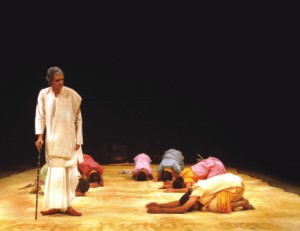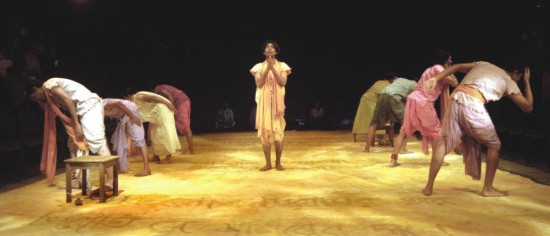 |
Colourful scenes of Haf Akhrai featuring a conflict of interest between Nidhu Gupta and his disciple |
Theatre
Conflict between Mentor and Disciple
Ershad Kamol
Do we always encourage new thoughts when it is a question of interest? Undermining his own supremacy can a guru always recognise his disciple's innovativeness? Set against the backdrop of a true story of 19th century, Ratan Siddiqui's play Haf Akhra confronts such dilemmas.
Dramatist Siddiqui has illustrated a conflict of interest between Ramnidhi Gupta -- popularly known as 'Nidhu Gupta', considered to be one of the most talented artistes of his time, who introduced Bangla 'tappa' songs -- and his once favourite disciple Mohan Chand. The playwright came to know from legendary Indian actor Utpal Dutt, states the playwright's comments included in the brochure of Haf Akhrai.
The play narrates the story of Ramnidhi Gupta who formed a musical troupe named Akhrai in 1804 through which his style of rendition as well as his songs became popular. Gupta believed in "art for art's sake" and he felt that appreciating music was not for everyone. The ailing guru retired in 1832 and conferred the leadership to Mohan Chand.
Soon after becoming the chief of the troupe Mohan Chand tried to set a new trend in terms of music composition with the belief that music is for the masses. With his innovative style, Mohan Chand began to present Bangla poetry fortified with rich traditional theatre elements from Vaishnava Padabali, Mangal Kavya, Nath Geetika and others.
 |
Ratan Dev and co-actors in a scene from Haf Akhra. |
Ramninidhi Gupta could not tolerate these changes, though once ignoring his mentor Gupta himself set free classical music from an exclusively religious atmosphere and introduced love as the focal theme of his songs and thereby attained huge popularity. And in response to his master's discontent, Mohan Chand left the Akhrai group and formed his own group named 'Half Akhrai'.
But, at the peak of his career Mohan Chand and his troupe members die in a mysterious arson attack.
As the subplot of the play, Siddiqui has aptly presented the fashionable elite class of Kolkata during the 19th century widely known as Babu Samaj, who followed a lavish lifestyle. At the same time, another historical fact: nature of the anti British movement at that time has come under the spotlight. Many revolutionaries in those days in disguise of artists continued their anti British campaign generating nationalistic fervour amongst the masses.
 Kudos to the director of the play Azad Abul Kalam for handling such complicated theme. He has successfully created diversified ambiences-- Akhra, brothel and others-- from all most on an empty space. The movements and voice modulation of the actors distinguished one scene from another: characters in case of representing Babu Samaj follow geometrical movements, on the other hand characters featuring masses are more live and move haphazardly on the stage. Kudos to the director of the play Azad Abul Kalam for handling such complicated theme. He has successfully created diversified ambiences-- Akhra, brothel and others-- from all most on an empty space. The movements and voice modulation of the actors distinguished one scene from another: characters in case of representing Babu Samaj follow geometrical movements, on the other hand characters featuring masses are more live and move haphazardly on the stage.
Moreover, music plays an important role in Kalam's directorial compositions. And the actors and choir rendered both classical genres and kirtans in tune. Shaiful Islam's artistic light design synchronises well with the directorial compositions.
Soulful performance by the actors could have made the play more enjoyable. The overall performance of the actors failed to present the scenes of conflict, tension, romance and comedy with the required impact.
Half Akhrai, the 15th production of Central Theatre department of Bangladesh Udichi Shilpi Goshthi, was staged at the Experimental Theatre Stage, Bangladesh Shilpkala Academy on February 11.
Copyright
(R) thedailystar.net 2009 |
